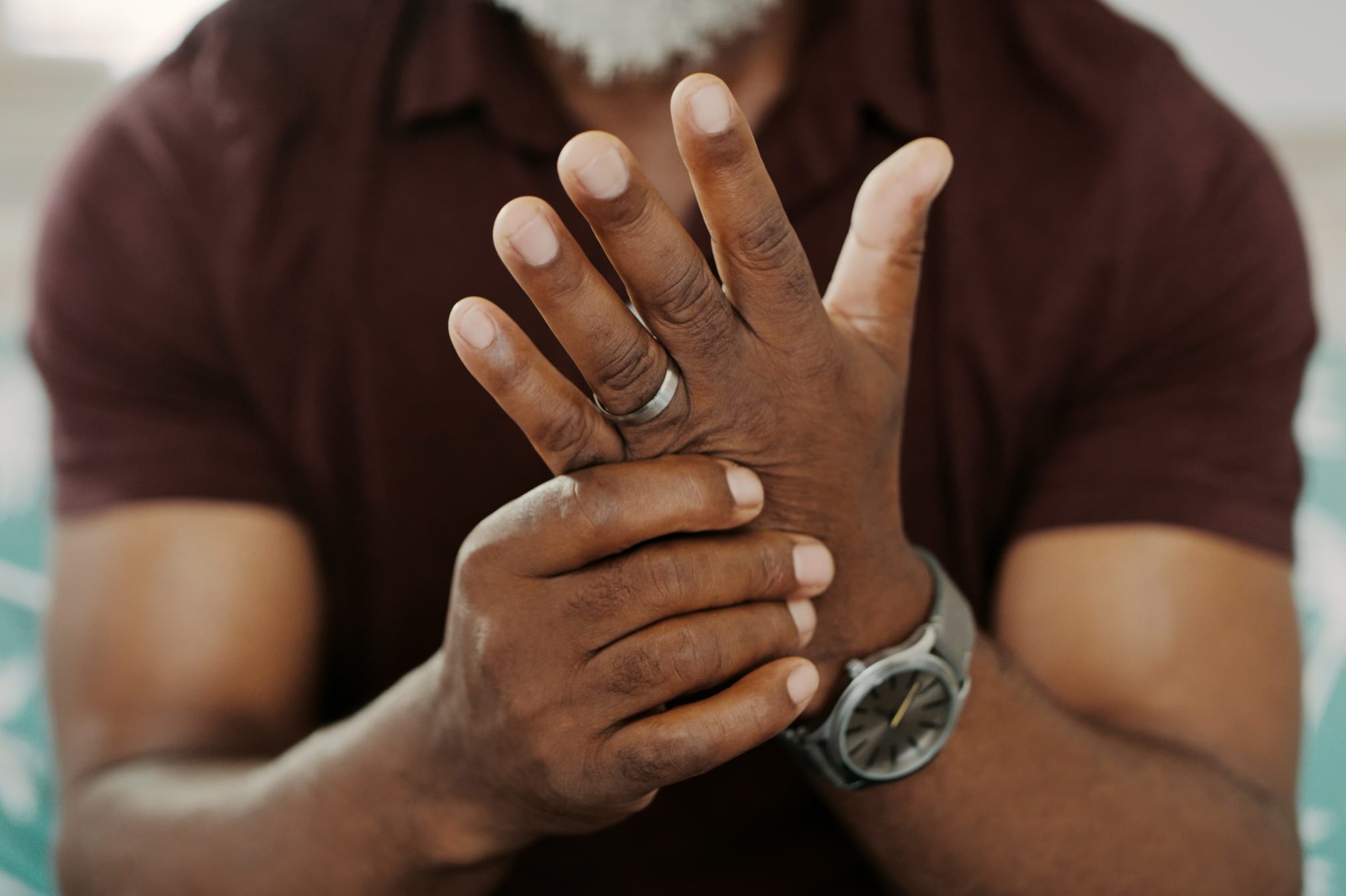About a quarter of Americans have arthritis, with osteoarthritis being the most common form. Countless ointments, lotions, pills and gadgets aim to ease arthritis symptoms, which can be debilitating. Many people are now turning to cannabidiol (CBD) products for relief. Here’s what to know about CBD and rheumatoid arthritis.
“People report benefits, particularly with topicals,” says Martin A. Lee, co-founder and director of Project CBD, a California nonprofit promoting CBD research.
Topicals include creams and other products applied directly to the skin. What’s the science behind these products? How should you choose between them? Here’s what you need to know about finding the best CBD creams for arthritis relief. CBD might not guarantee arthritis relief, so talk to your doctor first. Still, here are some products that meet our experts’ qualifications.
Best CBD creams for arthritis
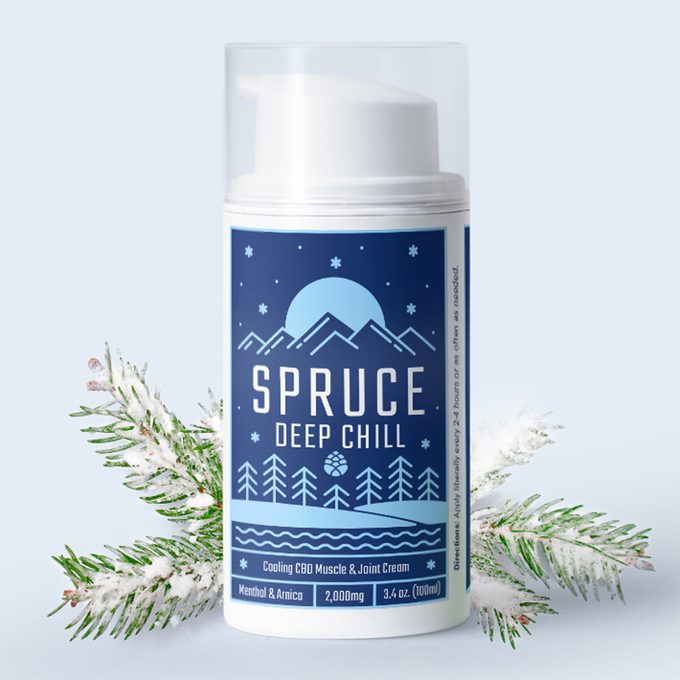 VIA MERCHANT
VIA MERCHANT
VIA MERCHANT
VIA MERCHANT
Recommended by the Rheumatoid Arthritis Support Network (RASN), Spruce Natural Labs sells only full-spectrum CBD products, all of which are tested independently. Ask for a certificate of analysis to confirm. For best results, the RASN recommends combining sublingual products with cream applied directly to the joint. Here are some doctor-recommended home remedies for arthritis.
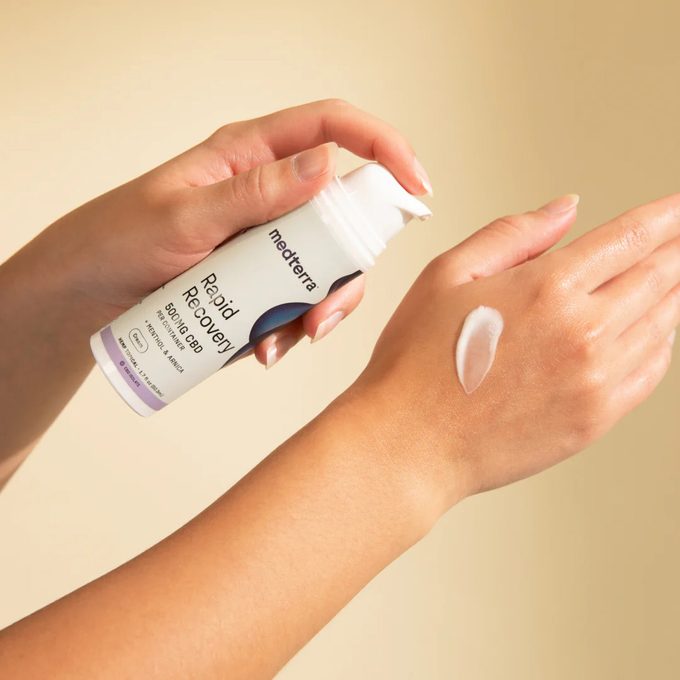 VIA MERCHANT
VIA MERCHANT
VIA MERCHANT
VIA MERCHANT
This cooling cream from Medterra consists of a CBD isolate that contains more than 99 percent CBD and 0 percent THC. CBD is grown in the U.S. and each batch is independently tested. The company ships to all 50 states and offers a 30-day money-back guarantee. Also check out these simple habits that reduce arthritis symptoms.
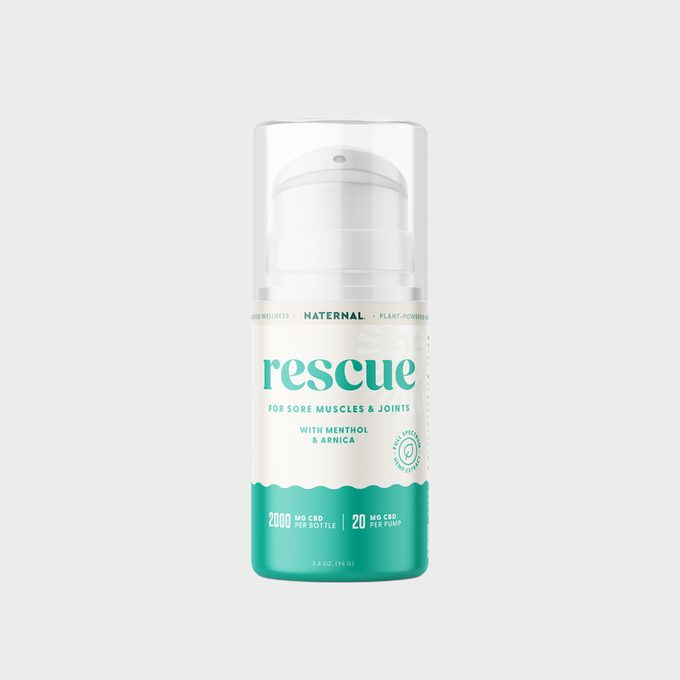 VIA MERCHANT
VIA MERCHANT
VIA MERCHANT
VIA MERCHANT
The product combines CBD with arnica, camphor, eucalyptus, and menthol and has a cooling sensation. Naternal is based in North Carolina and creates its products there. This product, and others, are tested by third-party labs for purity. Your diet may also trigger arthritis flare-ups. Here are the foods bad for arthritis.
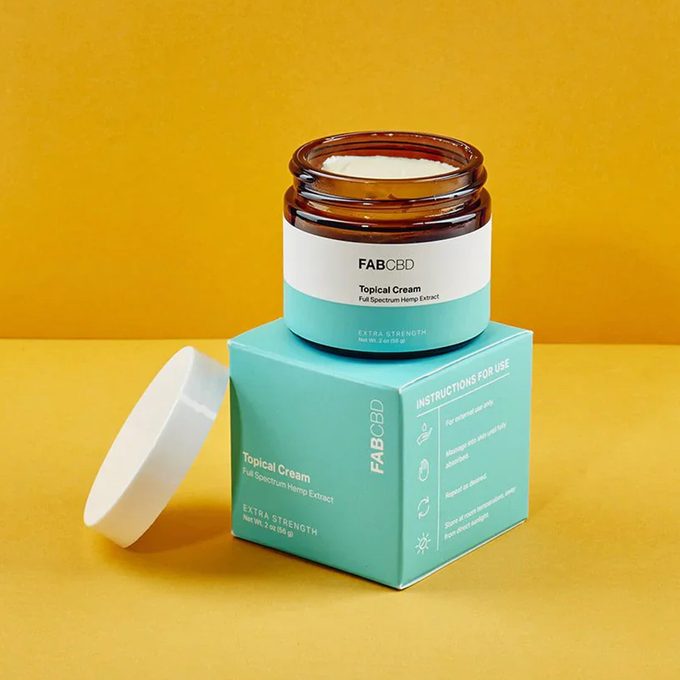 VIA MERCHANT
VIA MERCHANT
VIA MERCHANT
VIA MERCHANT
Another company that independently tests its products (and makes the certificates of analysis available online), FABCBD makes not just creams but gummies, oils, salve, and “superfoods.” This cream combines full-spectrum hemp extract with 600 mg of CBD. Here’s some doctor tips to prevent arthritis.
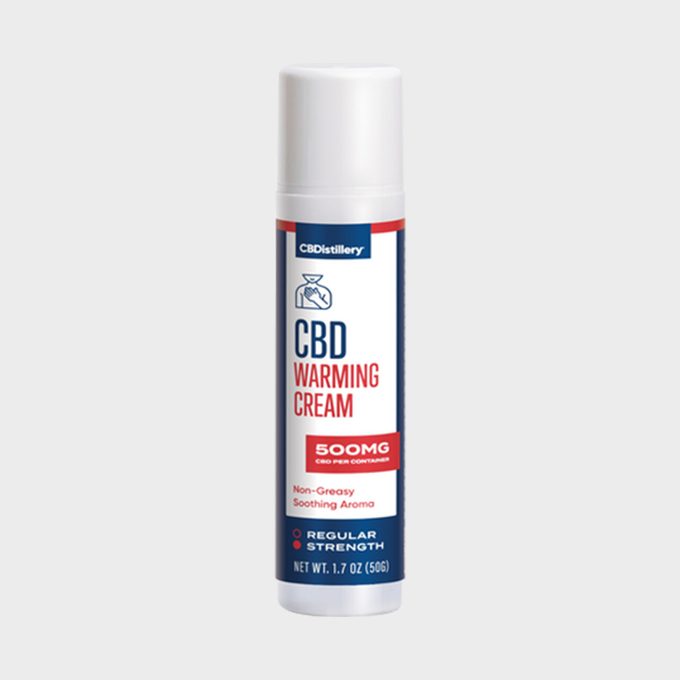 VIA MERCHANT
VIA MERCHANT
VIA MERCHANT
VIA MERCHANT
Each bottle contains 500 mg of CBD per bottle—or 5 mg per pump—and no detectable THC, as verified by a third-party lab. CBDistillery is based in Colorado.
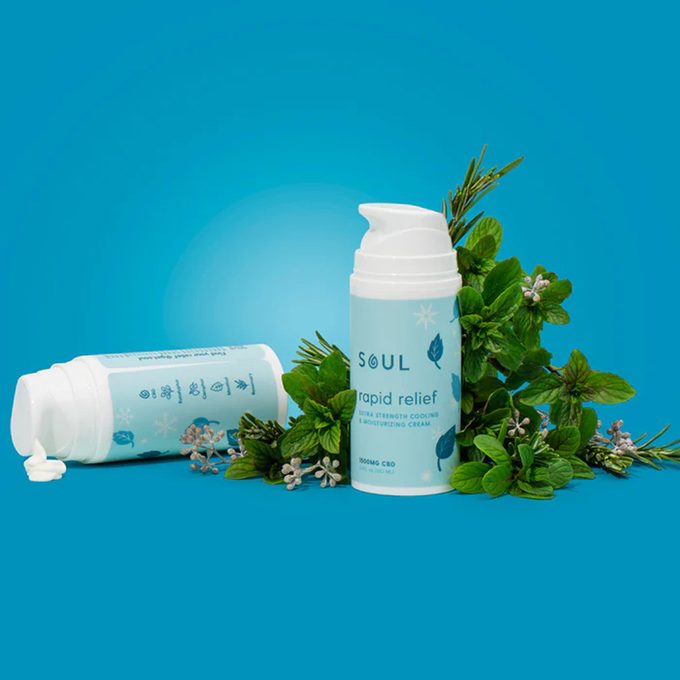 VIA MERCHANT
VIA MERCHANT
VIA MERCHANT
VIA MERCHANT
Soul’s Rapid Relief Cream contains 1500 mg of CBD per bottle, delivering strong pain relief. It also includes menthol and camphor—common ingredients in pain relief creams—to provide a cooling effect that eases arthritis discomfort.
What is CBD?
CBD can be extracted from both the marijuana plant and its cousin, the hemp plant. CBD is not the psychoactive ingredient in marijuana, though. Delta-9-tetrahydrocannabinol (THC) is the ingredient that can make you high. Typically, CBD products contain little to no THC and generally not enough to alter your mental state or make you fail a drug test.
CBD is often derived from hemp, which can only contain 0.3 percent or less THC. That’s compared to marijuana, which is a related plant that can contain 17 to 28 percent THC or even more. The 2018 Farm Bill allowed farmers to grow hemp as long as it didn’t contain more than 0.3 percent THC. Here’s more on the differences between CBD vs THC.
Learn your ABCs about CBD—what it is, what it helps, and how to take it—inside our all-new book, The Essential Guide to CBD.
Arthritis
Researchers haven’t conducted many human studies into CBD for arthritis. And their findings have been inconclusive. For instance, one analysis of four small studies, published in 2015 in Arthritis Care Research, concluded there wasn’t enough evidence to support recommending CBD for arthritis.
Research published in 2018 in Osteoarthritis and Cartilage suggests that CBD and a placebo were essentially equivalent in the treatment of osteoarthritis knee pain. However, the study hasn’t been vetted by other experts and only lasted 12 weeks which may or may not have been long enough to see an effect.
Preliminary findings from lab and animal studies are a bit more hopeful. One study in a 2015 issue of the European Journal of Pain, for instance, found that CBD gel relieved pain in rats with arthritis.
Other research published in 2019 in Current Opinion in Rheumatology suggests that CBD can affect different receptors involved with inflammation. But that is a far cry from saying CBD can actually relieve arthritis symptoms. Likewise, there is limited evidence that CBD can help with sleeplessness and anxiety, which can also plague people with arthritis.
Here are some natural arthritis remedies to try at home.
In its 2019 CBD guidelines for adults with arthritis, the Arthritis Foundation said that CBD “may help with arthritis-related symptoms, such as pain, insomnia, and anxiety.” It also noted that the compound can interact with other drugs.
Until there are more studies and FDA approvals, the Arthritis Foundation suggests the following guidelines on how best to try CBD:
- Don’t stop taking any disease-modifying anti-rheumatic drugs you’ve been prescribed for rheumatoid arthritis or other inflammatory forms of the condition.
- If you do try CBD, start with low doses and, if you feel you need more, increase by small amounts every week.
- Approach this as a new treatment and work with your doctor, keeping regular appointments.
- Buy from a company that has had its products tested by an independent lab.
Safety
The consensus among a number of organizations, including the National Institute on Drug Abuse, is that CBD is generally safe. People who are taking other drugs for arthritis, though, need to know that it can interact with common arthritis and pain medications, including Aleve and Celebrex, and certain antidepressants.
The National Library of Medicine keeps a complete list of potential drug interactions. But always talk to your doctor before trying CBD.
CBD can also cause drowsiness, lightheadedness, and, in rare cases, liver damage. CBD does not seem to harm your joints, says Jahan Marcu, founding partner of the cannabis consultancy Marcu & Arora and editor-in-chief of the American Journal of Endocannabinoid Medicine.
Types of CBD products
Before trying CBD, you’ll have to choose which kind of product to go with. There are three basic types:
- Full-spectrum CBD: This contains all of the components of the hemp plant (Cannabis sativa), including CBD and also small traces of THC and terpenes, which are plant compounds.
- Broad-spectrum CBD: This includes all of the components except THC.
- CBD isolates: The purest form of CBD, these should contain only CBD.
Full-spectrum or broad-spectrum products seem to work better when taken at lower doses because they include additional plant components that will have synergistic effects above and beyond effects from individual ingredients. This is known as the “entourage effect.”
Delivery systems
Products also differ by how they deliver the CBD. “You can ingest it [CBD edibles or CBD capsules], rub it on, or inhale it [vaping],” says Lee. You can also put it under your tongue (sublingual). Which variety you choose will affect how quickly it works.
Capsules and tablets “are likely to have a longer, deeper effect,” says Lee. But they “don’t come on as quickly.” Under the tongue and topical products, on the other hand, act more quickly, as does vaping, but vaping may involve some risks. For example, unregulated vape products may cause potentially life-threatening lung damage, a condition known as EVALI (short, for E-cigarette or vaping product use-associated lung injury), according to the Centers for Disease Control and Prevention. Learn more about CBD vape oil.
Some of it is personal preference (you may decide gummies just taste good) but many people with arthritis have reported relief when combining an oral product with a topical product, says Lee.
Creams and other topical products
Sara Jane Ward, PhD, assistant professor of pharmacology at Temple University Lewis Katz School of Medicine in Philadelphia, says there are multiple other reasons to opt for topical forms besides speed.
Those include avoiding “yucky-tasting oils in the mouth that are also sometimes difficult for people to measure out or take and to avoid adverse gastrointestinal effects like diarrhea associated with oral oils,” Ward says. Experts don’t yet know whether topicals can enter the bloodstream. If they don’t, you can also avoid the danger of any liver toxicity.
Here are the best CBD oils for pain.
What to consider when buying CBD creams for arthritis
Unless you’re working with a licensed medical dispensary, research products thoroughly before buying. Since CBD products are largely unregulated, labels might not accurately reflect ingredients or strength. The Arthritis Foundation recommends choosing products made in the United States from U.S.-grown ingredients.
Look for companies that follow FDA good manufacturing practices and use independent labs for product testing. These labs should use testing methods approved by the American Herbal Pharmacopoeia, U.S. Pharmacopeia or Association of Official Agricultural Chemists. Avoid products that claim to treat specific health conditions.
CBD concentration and strength
For arthritis treatment, higher CBD concentrations are often more effective. The Arthritis Foundation suggests that new users begin with around five to ten milligrams twice daily, gradually increasing the dosage after three or four days if needed. However, while CBD has minimal side effects, doses over 100 milligrams per day can become costly, the foundation notes.
Full-spectrum vs. broad-spectrum vs. CBD isolate
- Full-Spectrum: These creams contain CBD along with other cannabis plant extracts like terpenes, additional cannabinoids, and up to 0.3% THC.
- Broad-Spectrum: These creams include CBD and other cannabis plant extracts like terpenes and cannabinoids but contain no THC.
- CBD Isolate: These creams contain only CBD without any other cannabis plant extracts.
Research indicates that full-spectrum CBD creams often provide better relief for arthritis due to the “entourage effect”—the synergy of multiple compounds in the cannabis plant. If avoiding THC is a priority, broad-spectrum creams are also effective. CBD isolate creams can still help, but users often report less relief than full- and broad-spectrum options.
Ingredients
When choosing a CBD cream, carefully examine the ingredients. While CBD is the active component, many creams also contain common pain-relief ingredients like menthol, camphor or arnica. If you have sensitivities or allergies, look for CBD creams that exclude these ingredients. Even without allergies, you might prefer all-natural, organic, non-GMO ingredients to reduce the risk of adverse reactions. Natural CBD creams are generally less likely to irritate.
Quality assurance and lab testing
Third-party lab testing is crucial for CBD creams. This testing verifies the CBD content, purity and checks for contaminants like heavy metals or pesticides. Brands should provide Certificates of Analysis (COAs) from independent labs. Without these, there’s no way to confirm the product’s contents, so avoid brands that don’t share this information.
Application and absorption
Thicker CBD creams often provide more moisture but take longer to absorb. Thinner creams absorb quickly but may not be as moisturizing. Some may leave a residue. Massaging the cream into affected areas can enhance its absorption and effectiveness.
Scent and sensitivity
While added scents don’t affect CBD’s efficacy, they may irritate sensitive skin. Scents typically come from essential oils. If your skin is sensitive, unscented CBD creams might be a safer choice. In acute cases, consult your doctor.
Price and quantity
CBD creams vary widely in price. Lower-dosage options may cost around $40, while doctor-formulated, high-strength varieties can reach $200. To ensure value, look for creams with at least 500 mg of CBD per bottle or roughly 100 mg per ounce. User reviews can provide insight into a product’s effectiveness based on real experiences.
Why you should trust us
Amanda Gardner, a seasoned health reporter, has contributed to outlets like CNN, WebMD, HealthDay, Self Magazine, the New York Daily News, Teachers & Writers Magazine, the Foreign Service Journal, AmeriQuests (Vanderbilt University) and others. In 2009, she was writer-in-residence at the University of Wisconsin School of Medicine and Public Health.
To ensure the accuracy and reliability of this article, we consulted a comprehensive list of reputable, peer-reviewed scientific and academic sources.
- Centers for Disease Control and Prevention: “Arthritis”
- CDC: “Outbreak of Lung Injury Associated with the Use of E-Cigarette, or Vaping, Products”
- Arthritis Foundation: “Osteoarthritis”
- Arthritis Foundation: “Patients Tell Us About CBD Use” Martin A. Lee, co-founder and director, Project CBD and author, Smoke Signals: A Social History of Marijuana–Medical, Recreational, and Scientific
- Arthritis Care Research: “Efficacy, Tolerability, and Safety of Cannabinoid Treatments in the Rheumatic Diseases: A Systematic Review of Randomized Controlled Trials”
- Osteoarthritis and Cartilage: “Synthetic Transdermal Cannabidiol for the treatment of knee pain due to osteoarthritis”
- European Journal of Pain: “Transdermal cannabidiol reduces inflammation and pain-related behaviours in a rat model of arthritis”
- Current Opinions in Rheumatology: “Joints for joints: cannabinoids in the treatment of rheumatoid arthritis”
- National Institute on Drug Abuse: “Researching Marijuana for Therapeutic Purposes: The Potential Promise of Cannabidiol (CBD).”
- Arthritis Foundation: “CBD for Arthritis Pain: What You Should Know”
- National Library of Medicine: “Cannabidiol (CBD)”
- Jahan Marcu, PhD, founding partner of cannabis consultancy Marcu & Arora and editor-in-chief of the American Journal of Endocannabinoid Medicine
- National Conference of State Legislatures: “State Medical Marijuana Laws”
- Drug Enforcement Administration: “Drug Scheduling”
- Food and Drug Administration: “FDA Approves New Indication for Drug Containing an Active Ingredient Derived from Cannabis to Treat Seizures in Rare Genetic Disease”
- FDA: “FDA Regulation of Cannabis and Cannabis-Derived Products, Including Cannabidiol (CBD)”
- Arthritis Foundation: “Arthritis Foundation Releases First CBD Guidance for Adults With Arthritis”
- Sara Jane Ward, PhD, assistant professor of pharmacology, Temple University Lewis Katz School of Medicine, Philadelphia
- Arthritis Foundation: “CBD for Arthritis Pain: What You Should Know”
- Rheumatoid Arthritis Support Network: “Does CBD Oil Really Help Treat Arthritis Pain?”
- The Journal of the Missouri State Medical Association: The Problem with the Current High Potency THC Marijuana from the Perspective of an Addiction Psychiatrist
Sean Tirman, Content Updates Editor at Family Handyman, updated and contributed research to this piece. Sean has written shopping guides since 2016 and is a former associate editor at Gear Patrol.
How we found the best CBD creams for arthritis
Amanda Gardner conducted extensive research for this guide, evaluating CBD cream options and verifying their viability and trustworthiness against peer-reviewed journals and medical papers. The resulting list reflects rigorous fact-checking, quality assurance, testing and vetting.
FAQ
Is CBD legal?
CBD, excluding THC, is legal in 36 states, as well as the District of Columbia, Guam, Puerto Rico and the U.S. Virgin Islands. However, it remains federally illegal. The U.S. Drug Enforcement Administration classifies marijuana and all its components as Schedule I controlled substances, though hemp-derived CBD is not illegal. The FDA has only approved one CBD-derived drug, Epidiolex, for treating rare childhood epilepsy. Otherwise, CBD products lack FDA regulation.
How long does it take for CBD cream to work for arthritis?
Typically, arthritis sufferers feel relief from CBD cream within 20 minutes, with effects lasting about three hours.
Is it okay to use CBD cream every day?
Yes. CBD is non-psychoactive and naturally derived from hemp, so it’s safe to use daily—even multiple times a day—without negative side effects.
What are the cons of CBD cream?
As with any topical cream, you might be allergic to CBD and could develop a rash. If this occurs, stop using the product, monitor the rash, and seek medical attention if it doesn’t improve.




















